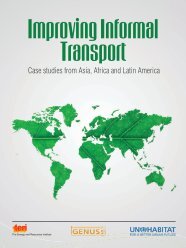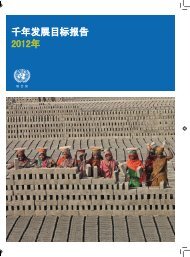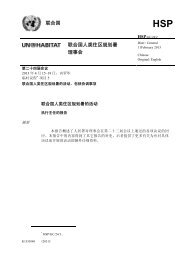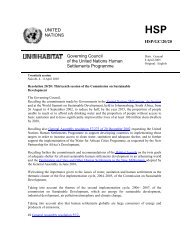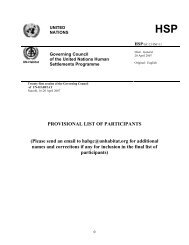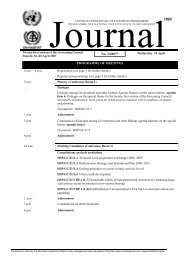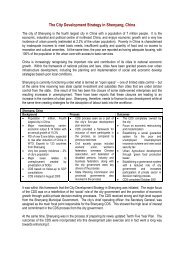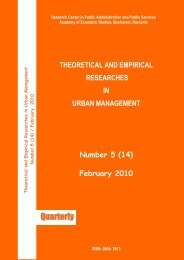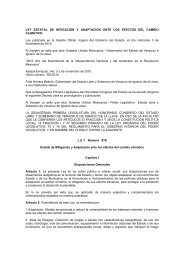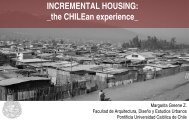Harmonious cities - UN-Habitat
Harmonious cities - UN-Habitat
Harmonious cities - UN-Habitat
You also want an ePaper? Increase the reach of your titles
YUMPU automatically turns print PDFs into web optimized ePapers that Google loves.
People<br />
<strong>UN</strong>-HABITAT working with young men and women<br />
The <strong>UN</strong> system officially defines youth as those aged 15-24. Globally,<br />
children and young people under 24 account for roughly 40<br />
percent of the global population. Indeed, young people, many in<br />
the developing world condemned to live on the streets, are on<br />
the frontline of growing urban poverty, child trafficking, sexual<br />
exploitation, high unemployment, crime and violence, HIV/<br />
AIDS and other diseases.<br />
l One out of three people in the developing world is under<br />
14.<br />
l In the developing world today, 57 million young men and<br />
96 million young women are illiterate.<br />
l One out of three people in the developing world is under 14.<br />
l Over 70 million youths globally are unemployed, the majority<br />
in developing countries.<br />
<strong>UN</strong>-HABITAT recognises young people as active participants<br />
in the future of human settlements, the <strong>UN</strong> parlance for towns<br />
Engaging<br />
<strong>UN</strong>-HABITAT has devised a Youth strategy for enhanced<br />
engagement that works directly with youth-led groups.<br />
Informing<br />
<strong>UN</strong>-HABITAT recognises young people as key to the future<br />
in an urbanizing world. Young people need to be informed<br />
of every opportunity to which they, like everyone<br />
else, have an equal right.<br />
Advising<br />
A policy dialogue on youth, children and urban governance<br />
has been developed to promote dialogue and action on giving<br />
young people a role in urban governance.<br />
Connecting<br />
<strong>UN</strong>-HABITAT initiates partnerships with youth organisations<br />
around the world. The agency regularly invites young<br />
people to its big international gatherings, like the World<br />
Urban Forum, so that their voices are heard on the world<br />
stage.<br />
Empowering<br />
<strong>UN</strong>-HABITAT is setting up a series of computerised One-<br />
Stop youth information resource centres to help young<br />
URBAN WATCH<br />
and <strong>cities</strong>. <strong>UN</strong>-HABITAT fosters partnerships with youth organisations.<br />
It works with partners like Stahlhofen and Lam to<br />
ensure their voices get heard on the world stage. Working with<br />
young men and women and understanding their diverse abilities,<br />
realities and experiences is an essential element of <strong>UN</strong>-<br />
HABITAT’s drive for sustainable urbanisation.<br />
Other <strong>UN</strong>-HABITAT departments that engage with young<br />
people include the Safer Cities Programme, the Sustainable Cities<br />
Programme that deals with environment, the Training and<br />
Capacity Building Branch and the Water and Sanitation team,<br />
which is promoting water conservation widely in schools and<br />
local communities in many developing countries, as well as the<br />
Youth Empowerment Programme that is imparting skills in<br />
construction technology to promote access to affordable housing<br />
and improve the livelihood of young people, for example<br />
through the Moonbeam Youth Training Centre in Nairobi. u<br />
people living in poverty equip themselves better for employment<br />
through vocational training, apprenticeships.<br />
Consulting<br />
<strong>UN</strong>-HABITAT’s Urban Youth initiatives seek to engage<br />
and empower young people in urban poverty reduction responsibilities.<br />
It sees consultation and listening as a key to<br />
youth-led development.<br />
Doing<br />
Starting with the continent facing some of the greatest<br />
poverty challenges, and in the context of the New Partnership<br />
for Africa’s Development, <strong>UN</strong>-HABITAT has developed<br />
the Global Partnership Initiative on Urban Youth<br />
Development in Africa, the continent with the greatest<br />
problems. The intiative was started at the behest of governments<br />
which oversee the agency. This initiative was devised<br />
subsequent to a Governing Council resolution and in<br />
partnership with other relevant United Nations agencies,<br />
multilateral institutions and private foundations. This<br />
resolution also seeks to ensure “the active participation<br />
of <strong>UN</strong>-HABITAT in the Secretary General’s initiative on<br />
youth employment”. Some of the fruits of that resolution<br />
are the One-Stop Youth and We are the Future Centres.<br />
u r b a n<br />
November 2008 WORLD 51




